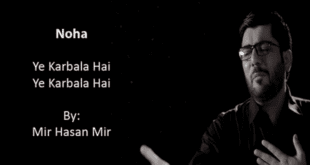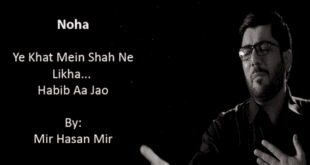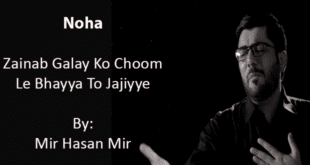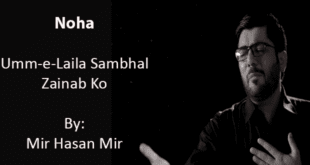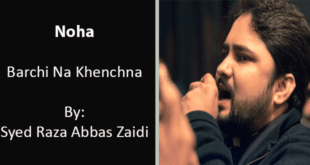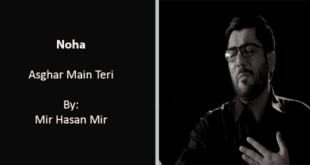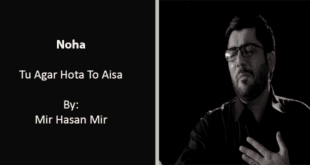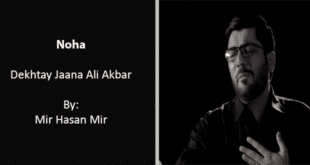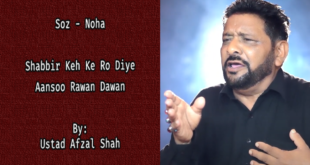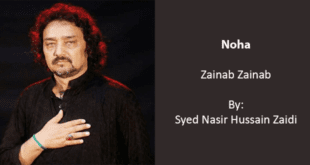Ye Karbala Hai Ye Karbala Hai Yahan sambhal kar kadam uthana.Ye Karbala hai… Ye baat hargiz na bhool jaana.Ye Karbala…Yahan sambhal kar kadam uthana.Ye Karbala… Jahaan-e-sabr-o-riza yehi hai.Khuda-e-sabr-o-riza yehi hai.Yahan pe aatay hain chal ke Mehdi.Bahisht-e-Zehra ye sar zamee’n hai.Yahan hai Zehra ka aana jaana.Ye Karbala…(x2) Yahan sambhal kar…Ye Karbala…(x2) …
Read More »Habib Aa Jao. Ye Khat Mein Shah Ne Likha
Habib Aa Jao یہ خط میں شاہؑ نے لکھا حبیب ؑ آجاؤ اے فقیہہِ حسین ؑ اے حبیبِ حسین ؑ حبیب ابن مظاہر ؑ اے فقیہہِ حسین ؑ اے حبیبِ حسین ؑ یہ خط میں شاہؑ نے لکھا حبیب ؑ آجاؤ تمہارا دوست ہے تنہا تمہارا دوست ہے تنہا۔Habib Aa …
Read More »Zainab Galay Ko Choom Le Bhayya To Jaaiyye
Rukhsat ko aaye khaimay mein jab shaah-e-Karbala.To bint-e-Ali ne jod ke haathon ko di sada.Zainab galay ko choom le bhayya to jaaiyye (x2). Zainab galay ko choom le bhayya to jaaiyye.So jaaye thodi dair Sakina to jaaiyye.Zainab Galay… So jaaye thodi dair… Amma kahengi dekh ke chehra lahu bhara.Zainab ne …
Read More »Umm-e-Laila Sambhaal Zainab Ko
Umm-e-Laila sambhaal Zainab ko Ghareeb e Zehra pa. Kya waqt hai ghareebi ka.Garebaa’n chaak hai baalon mein khaak e karbobala.Talaash kartay hain rasta nazar nahi aataYe haal dekh ke hanstay hain sheh pa ahl e jafa.Bahan ki kaandhon pa kull kaayinaat laatay hain.Kadam kadam pa ye awaaz detay jaatay hain. …
Read More »Barchi Na Khenchna – Syed Raza Abbas Zaidi
Bolay pidar se Akbar barchi na khenchna (x2). Hai jaan ab labon par (x2). Barchi na khenchna. Bolay pidar se Akbar barchi na khenchna.
Read More »Asghar Main Teri – Mir Hasan Mir 2018
Asghar Main Teri Maa Hun Aaja Asghar Aaja Asghar (x2). Aaja Asghar Aaja Asghar (x2). Asghar main teri maa hun (x2). Aa jao chaand meray teri pyaas main bujhaaon. Asghar main teri maa hun. Meray laadlay kahan ho (x2). Seenay tumhain lagaaon. Asghar main… Aa jao chaand meray teri pyaas …
Read More »Tu Agar Hota To Aisa – Mir Hasan Mir 2018
Check out other write-ups for Mir Hasan Mir https://52.64.252.41/tag/mir-hasan-mir/ Visit https://www.youtube.com/MirHasanMir for more videos
Read More »Dekhtay Jaana Ali Akbar – Mir Hasan Mir 2018
Dekhtay Jaana Ali Akbar Check out other write-ups for Mir Hasan Mir https://52.64.252.41/tag/mir-hasan-mir/ Visit https://www.youtube.com/MirHasanMir for more videos
Read More »Shabbir Keh Ke Ro (Noha) – Afzal Shah – 90’s
Shabbir Keh Ke Ro Diye Aansoo Rawaa’n Dawaa’n Shabbir keh ke ro diye aansoo rawaa’n dawaa’n. Aye laal teri aaj hai yeh aakhri azaan (x2).Shabbir keh ke… Akbar tumhari maut ka sadma sahoonga main (x2).Royegi be kasi pe zamee’n aur aasmaa’n.Shabbir keh ke… Akbar ki maut uss dil-e-muztar se poochiye …
Read More »Zainab Zainab – Nasir Hussain Zaidi
Zainab Zainab Zainab Zainab Zainab Zainab Zainab. Zainab Zainab Zainab Zainab. Kehtay thay Shaah-e-Karbala. Zainab Zainab Zainab Zainab. Zainab… (x2) Honay ko hain hum bhi juda. Zainab… Zainab… (x2) 1. Chalti rahi sheh par churi. Roti rahi dar par khadi. Mola Ali ki laadli. Kehti thi ye kismat meri. Main …
Read More » Abul Hasan Lakhani About Everything I Love!
Abul Hasan Lakhani About Everything I Love!
